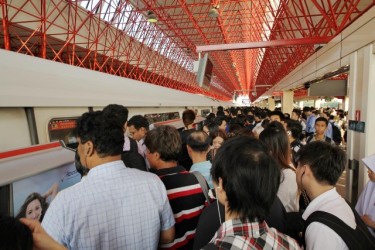The petition of Singapore’s transport operators SMRT (train service) and SBS (bus transit) for a fare increase has sparked a debate on the quality [1] and future of the public transportation system in the prosperous city state. The opposition Workers Party has proposed the creation of a ‘non profit oriented’ National Transport Corporation [2] to improve the bus and train operations in the city.
Gerald Giam of the Workers Party explains the advantages [3] of having a government-run transport system:
The National Transport Corporation should not be profit-oriented but should aim to provide public transportation services on the basis of cost and depreciation recovery.
Having a National Transport Corporation would not necessarily mean higher subsidies or a loss-making endeavour. If competently run, the Corporation could reduce costs associated with the duplication of functions and roles.
We have seen many examples of efficiently run publicly-run service providers in Singapore in the past.
Minister for Transport Lui Tuck Yew is opposed to the nationalization of the transport system but confirms the inefficiencies [4] of the SMRT and SBS:
Improving capacity, addressing crowdedness on buses and trains, frequency and reliability of service – these are among the key aspects. I have experienced the discomfort and frustrations that commuters faced because of the congestion and the sometimes unreliable service and I share your desire to see improvements to our public transport.
Lim Weiliang thinks that lack of real competition [5] prevents the SMRT and SBS from improving their services:
With the monopoly structure in place, the operators have no incentive to improve their service standards – they merely need to do the bare minimum, while at the same time focusing on maximising their top and bottom lines. Apart from increasing fares, this can be done through advertising, which already accounts for a huge percentage of their operating revenues.
Blogging for Myself believes that the SMRT and SBS management prioritizes [6] their shareholders over commuters:
My take is that we want the transport operators to put commuters as their number one priority. Problem is they operate under a structure where shareholders’ and management interests rank ahead of commuters. As long as you stick with these priorities, commuters would be short changed.
The Thinking Fish Tank offers a solution: make all Singaporeans SMRT and SBS shareholders [7]:
Commuters want better service and lower fares while operators want higher revenue and lower cost, both of which are easily achieved at the expense of the commuters in a non-competitive oligopoly market structure. Yet, to align the incentives of operators to commuters by nationalizing public transport may prove to be a costly and futile endeavor. Thus, I propose the simple solution of aligning the interests of commuters to that of operators by making all Singaporeans SMRT and SBS shareholders! That way, commuters can stand to benefit from fare increases in the form of dividends paid each year. Consequently, this will make fare increases more palatable in the future.
R Ganesh of The Satay Club dissects the problems [8] of the public transport system:
The current situation with regards to public transport – as well as certain other industries in Singapore – brings us the worst of both worlds. It combines the downsides of nationalisation (inefficiency, no incentive to improve service, no incentive to lower costs) with the downsides of privatisation (profiteering, attempting to reduce consumer surplus, focus on bottom line above all else).
Desparatebeep is not supportive [9] of the proposed nationalization of the transport system:
What can be done be done about this? Well, let’s start with the realisation that governments are good at doing certain things and businesses are good others. These two don’t exactly compliment each other and the skill sets required to be good at the government things are not the same skills that are needed to be good at the business things.
Competition has been proven to be a good thing and the last thing we need in Singapore is more government. Let’s work towards separating government and business and create a better Singapore.
